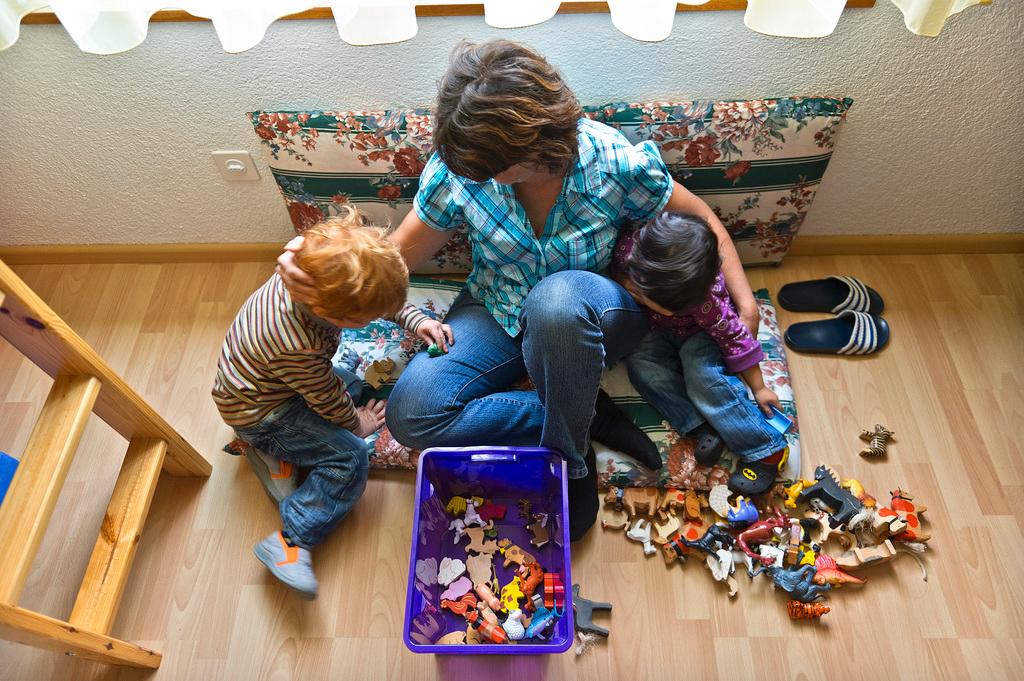Schools seen as childcare solution

Switzerland is lagging behind other countries when it comes to the primary school system being compatible with the needs of working parents. Pressure for longer school days and out-of-school hours care has been growing, but not everyone likes the idea.
For many parents – particularly mothers – working around the Swiss school day is a challenge.
“It already starts in Kindergarten. The school structure is set up as morning school and children come home at lunchtime. If they have afternoon lessons, they only have to go back at about 1.30 or 2pm. So it’s a long lunch break which has to be covered, and fitting your work schedule into four hours in the morning is almost impossible,” Monika BütlerExternal link, Professor of Economics at the University of St Gallen, and a mother of two, told swissinfo.ch.
Some families use out-of-school hours care, such as a hot lunch or after-school care, to plug the gaps. But these can be very fragmented, with children having to go to another building than school for lunch, with other caregivers and away from their friends – a mental stress for the children, Bütler says.
Other parents rely on grandparents or neighbours to help, but even this can be a juggle.

More
Reconciling work and family life
Costs are another factor – it can cost a middle to higher income family around CHF70 ($72) a day for out-of-school hours care.
A continuous school day, as found in many other countries, is not the norm (see box). In fact, there are only around seven such state schools in the country, with the rest being privately run.
Government reacts
The Swiss government is aware of the challenges. It confirmed on September 18, 2015External link that a draft law to provide an extra CHF100 million over eight years towards childcare, particularly for school-age children, had been sent for consultation. This follows on from financing that had created 48,000 childcare places in the last 12 years.
It wants to support the cantons and communes – who under Switzerland’s federal system are responsible for educational matters – in extending daycare services and making them cheaper.
Swiss parents face among the highest childcare costs in the world. This is a factor in why many women do not work or only work part-time, the government said.
Pressure has been building for change. Shortly before the government’s announcement, politicians, academics, including Bütler, and educational specialists had come together for a conference in Bern on the development perspectives for ‘day schools’ and out-of-school hours care.External link
Cultural question
Attending was Nadine Hoch of Kibesuisse,External link the Swiss childcare association, who said that the current school situation was due to a question of costs – but was also cultural.
“There is this tradition that children have lunch at home, this comes from the post-war time when it was traditional for the mother to stay at home and look after the children because one income was enough for the family,” Hoch told swissinfo.ch.
Quite why this image has persisted, Hoch doesn’t know. But she does see drivers for change coming from the need to combine work and family, greater equality between the sexes and the advantages of integration for only children or children from migrant backgrounds.
There is an economic reason as well. “We are going towards a lack of qualified people in the work market and it’s only in the economy’s interest that we get well qualified mothers back into the workplace,” Hoch said.
But should there be all-day schools or out-of-school hours care? Switzerland is at the moment tending towards out-of-school hours care, and this is fuelled by demand. Thus it is better in urban areas – Geneva and Basel city are the cantons with the best coverage. In the more traditional countryside, you are often lucky to find a lunch service, Hoch said.
The French-speaking part of Switzerland has similar situation, although in at least three cantons parents pay only a third of the childcare costs, the rest being shared by local authorities and employers through salary contributions. In German-speaking Switzerland, parents often pay two-thirds to 100% of the costs themselves.
But Hoch thinks all-day schools will eventually come, as there are political motions in this direction.
Opposition
There is, however, opposition to change – you only have to look at the rejection in March 2013 by voters of a proposed amendment to the Swiss constitution aiming to improve conditions for parents wishing to combine work and family.
Parties such as the conservative right Swiss People’s Party lament the move away from the traditional family model. When the government’s extra daycare funding was first mooted in May, it decried what it saw as state meddling in private family matters.External link
Politically it’s not an easy issue, as Christoph Eymann, head of the Swiss Conference of Cantonal Ministers of Education, and in charge of education for canton Basel city, sketched out for the Bern conference.
He, too, pointed to the societal changes driving the need for ‘day school’ but said that it often boiled down to finances. Many schools do not have the infrastructure or personnel for school-based daycare; investments are needed, parental contributions have to be considered.
Choice, the future
Eymann also pointed to the freedom of choice – a factor important to many parents. ‘Day school’ should not be obligatory, he said. “It should be possible for a family, also in the future, to be able to decide when and how much it wants to place its children in ‘day school’.”
Bütler believes parents should pay or provide lunch, but that the basic structure of school from 8.30am to 3-4pm should be free of charge, 5 days a week. If we scale down a bit on regulation, the longer hours could be provided at no extra costs for the communities, she says. Parents should pay for after-school care (as is the case in many countries).
What is needed are pioneering schools to try out the all-day school system. “There are already initiatives in many towns, and once people and politics realise it works, I’m pretty sure we’ll go in that direction eventually. It’ll take time though,” she said.
European comparison: primary schools
France: The primary school week is organised around 9 half days with 5.5 hours teaching a day. Classes start 8-9am and finish 4-5pm. Lunch at least 1.5 hours (at home or at school).
Germany: Lesson times are normally 7.30/8.30am-1.30pm or 11.30am. Lunch normally at home. Länder (regions) currently expanding provision of extra-school care. Some primary schools have fixed opening hours (usually up to 2pm). In 2012, 49.5 per cent of all public and private primary schools were all-day schools.
Italy: Daycare is the responsibility of the communes. Schools can offer a 24-hour model (no daycare, morning lessons) or up to 40 hours with canteen and daycare. There are 27 and 30 hour options which combine daycare/lunch/afternoon lessons to various degrees.
England: Schools are open between 9.00 am and 3.30/4.00pm with 1 hr for lunch. Schools can extend the day for additional teaching or extracurricular activities. In 2014, 64% of all primary schools provided before school care and 70% after school care.
Source: Euridyce, (European Commission)

In compliance with the JTI standards
More: SWI swissinfo.ch certified by the Journalism Trust Initiative











You can find an overview of ongoing debates with our journalists here . Please join us!
If you want to start a conversation about a topic raised in this article or want to report factual errors, email us at english@swissinfo.ch.